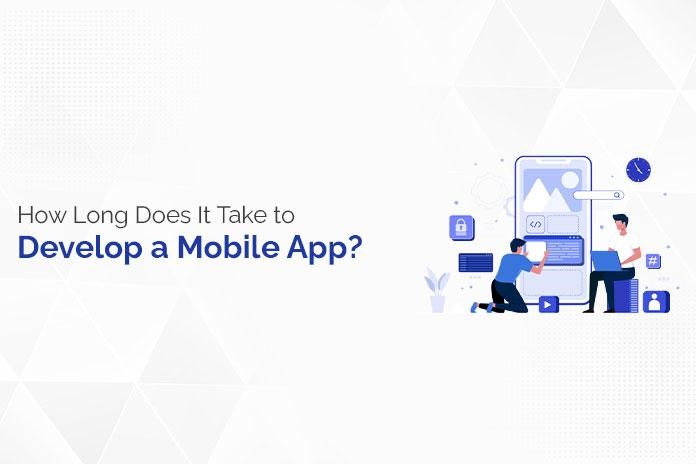With the instability of the mobile app market, Just how long does it take to build an app for mobile? remains one of the most frequently requested concerns. The length of time it takes to construct an app will depend on a variety of things, thus the answer is complicated. The intricacy of the intended app design and the team’s extent of expertise are only two of the numerous factors that determine the duration of the development phase.
We are going to cover several factors that either directly or indirectly impact a mobile app’s development process. This article will also help businesses to select mobile app development services for their projects.
Understanding Mobile App Development Process
Understanding the phases of mobile app development is crucial before digging into the timeline:
1. Conceptualization:
The main focus is on developing the app in this stage, where market research is conducted and goals, target user base, and features are defined.
2. Design:
The wireframe, prototype, and visual design will help to maintain the user-friendly performance of the interface during its creation.
3. Development:
Developers achieve this by means of well-known programming languages, such as Java for Android or Swift for iOS, during the creation of features and their integration.
4. Testing:
In order to detect any existing problems or solve them, QA expertise builds many tests, such as usability, compatibility, or functionality tests.
5. Deployment:
Once all the tests are completed, the team will upload it to the approval process and make it available in the given app stores (App Store for Apple, Google Play for Google).
6. Maintenance:
To guarantee the app’s peak functionality and user satisfaction, developers provide updates, correct problems, and improve features after launch.
Factors Influencing App Development Timeline
Let’s now evaluate the main variables that determine how long it takes to create a mobile application:
1. App Complexity:
It is worth mentioning that more complex applications with a wide functionality (like social networks, online shops, and games) need around six months to a year to be designed, while apps with fewer functions could be developed within a month or two.
2. Platform (iOS/Android):
It is commonly found that cross-platform programs that can run both platforms take more time to be consequently designed than native ones that run on a single platform.
3. Team Expertise:
The pace and caliber of app development are greatly influenced by the experience and aptitude of the development team. A competent team can overcome obstacles more quickly and simplify the process.
4. Third-Party Integrations:
Including third-party APIs in the development process can increase complexity and delay. Examples of these APIs include payment gateways, mapping, and social media platforms.
5. Design Complexity:
To create an app that is visually attractive as well as intellectually fascinating, elaborative UI/UX designs, animations, and custom visuals must be used, and these things take a lot of time in the whole development process.
6. Testing and Quality Assurance:
Before the app is released, extensive testing and QA procedures are required to identify and address any issues. It is not ideal to speed through this phase since it might lead to post-launch problems that leave people disappointed.
7. Regulatory Compliance:
Apps that must adhere to laws (such as GDPR and HIPAA) may take more time to develop security protocols, data protection policies, and other legal requirements.
8. Client Input and Iterations:
The client’s feedback and authorization procedure can also have an impact on the app development schedule. Development times may increase if iterations are made in response to input.
Typical Timelines for App Development
Although every mobile application project is different, the following basic estimates apply to several app categories:
– Basic Applications (such as to-do list, calculator, etc.): one to three months
– Moderately Complex Applications (such as those for social media and e-commerce): three to six months
– Extremely Complex Applications (like Gaming and Enterprise Solutions): at least six months to a year
It is important to remember that these time frames are estimates that may change depending on the previously listed reasons.
Choosing Right Mobile App Development Partner
The selection of the mobile app development agency is the key factor that will either make your mobile app project successful or fail tremendously. The following important factors will assist you in making an educated decision:
1. Experience and Expertise:
Seek a partner with an established track record of successful mobile app development, ideally with a background in your sector or specialty. Assess their case studies, portfolio, and customer endorsements to determine their level of experience.
2. Team composition:
Producing high-caliber apps requires a knowledgeable and committed team. Ensure that the development team is composed of experienced developers, UI/UX designers, project supervisors with qualifications, and quality assurance specialists.
3. Technological Proficiency:
Choose a partner who is highly familiar with the latest tools used in app development—the ones that are more beneficial to you. Applications of such technologies include Flutter for cross-platform development, Swift or Kotlin for iOS and Android native development, and cloud services for scalability.
4. Collaboration and Communication:
The basis of a successful relationship is successful teamwork and communication. A good partnership is built on the foundation of transparency, through which the development partner should regularly give updates and feedback, and you should be invited to contribute.
5. Support and Maintenance:
The duration of an app depends on its subsequent post-launch assistance and maintenance. In order to ensure that the app runs smoothly, customers are satisfied, and you have a reliable partner, choose a partner who offers consistent support, revisions, and troubleshooting services.
This lets you achieve your app goals effectively, reduce risks, and get your product to market as soon as possible when you factor in all these variables and pick a mobile app development company you can trust.
Conclusion
A mobile app’s development time is influenced by a number of variables, such as platform, team expertise, complexity, testing rigor, regulatory concerns, and client collaboration. You are able to successfully go through the app development process and realize your app concept by being aware of these variables and selecting the best development partner. For mobile app projects, businesses can either go for Android app development or iOS app development; depending upon their requirements.
Tags – mobile app development services , Android app development
Author Bio –
Kartik Patel
Elegant MicroWeb is a Software Development and Offshore Talent Outsourcing Industry based out of Ahmedabad, India. With our expertise in the field, we are providing services that far surpass the conventional industry standards and exceed client requirements. Contact us for more details!








